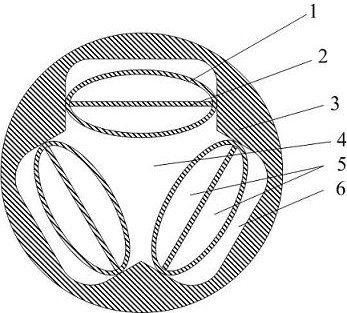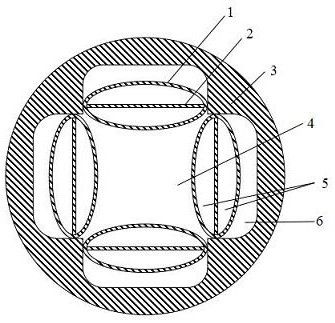Anti-resonance hollow-core optical fiber
A technology of hollow-core fiber and anti-resonance, which is applied in cladding fiber, light guide, optics, etc., can solve the problems of difficult to control the thickness, position and shape of the dielectric layer, increase the cladding nodes of the fiber, and affect the characteristics of the fiber. Effects of damage threshold, increased transmission bandwidth, and reduced material absorption loss
- Summary
- Abstract
- Description
- Claims
- Application Information
AI Technical Summary
Problems solved by technology
Method used
Image
Examples
Embodiment 1
[0021] The invention provides a multi-resonant layer hollow-core optical fiber, such as figure 1 As shown, the optical fiber is composed of a first-type dielectric tube 1, a first-type dielectric layer 2 and a second-type dielectric tube 3, including a high-refractive-index cladding region and a low-refractive-index core region. The first-type dielectric tube 1 and the first-type medium layer 2 are connected to the second-type medium pipe 3 . The area surrounded by the outer wall of the first-type dielectric tube close to the core area forms the first-type hole 4, which is the fiber core area. A second-type hole 5 is isolated between the first-type medium pipe 1 and the first-type medium layer 2 , and a third-type hole is isolated between the first-type medium pipe 1 and the second-type medium pipe 3 .
[0022] The first-type medium pipe 1 and the second-type medium pipe 3 are connected in a tangential manner; both ends of the first-type medium layer 1 are connected to the se...
Embodiment 2
[0025] The invention provides a multi-resonant layer hollow-core optical fiber, such as figure 2 As shown, the optical fiber is composed of a first-type dielectric tube 1, a first-type dielectric layer 2 and a second-type dielectric tube 3, including a high-refractive-index cladding region and a low-refractive-index core region. The first-type dielectric tube 1 and the first-type medium layer 2 are connected to the second-type medium pipe 3 . The area surrounded by the outer wall of the first-type dielectric tube close to the core area forms the first-type hole 4, which is the fiber core area. A second-type hole 5 is isolated between the first-type medium pipe 1 and the first-type medium layer 2 , and a third-type hole is isolated between the first-type medium pipe 1 and the second-type medium pipe 3 .
[0026] The first-type medium pipe 1 and the second-type medium pipe 3 are connected in a tangential manner; both ends of the first-type medium layer 1 are connected to the s...
Embodiment 3
[0028] The invention provides a multi-resonant layer hollow-core optical fiber, such as image 3 As shown, the optical fiber is composed of a first-type dielectric tube 1 , a first-type dielectric layer 2 and a second-type dielectric tube 3 , including a cladding region with a high refractive index and a core region with a low refractive index. Both the first-type medium pipe 1 and the first-type medium layer 2 are connected to the second-type medium pipe 3 . The area surrounded by the outer wall of the first-type dielectric tube close to the core area forms the first-type hole 4, which is the fiber core area. A second-type hole 5 is isolated between the first-type medium pipe 1 and the first-type medium layer 2 , and a third-type hole is isolated between the first-type medium pipe 1 and the second-type medium pipe 3 .
[0029] The first-type medium pipe 1 and the second-type medium pipe 3 are connected in a tangential manner; both ends of the first-type medium layer 1 are co...
PUM
 Login to View More
Login to View More Abstract
Description
Claims
Application Information
 Login to View More
Login to View More - R&D
- Intellectual Property
- Life Sciences
- Materials
- Tech Scout
- Unparalleled Data Quality
- Higher Quality Content
- 60% Fewer Hallucinations
Browse by: Latest US Patents, China's latest patents, Technical Efficacy Thesaurus, Application Domain, Technology Topic, Popular Technical Reports.
© 2025 PatSnap. All rights reserved.Legal|Privacy policy|Modern Slavery Act Transparency Statement|Sitemap|About US| Contact US: help@patsnap.com



